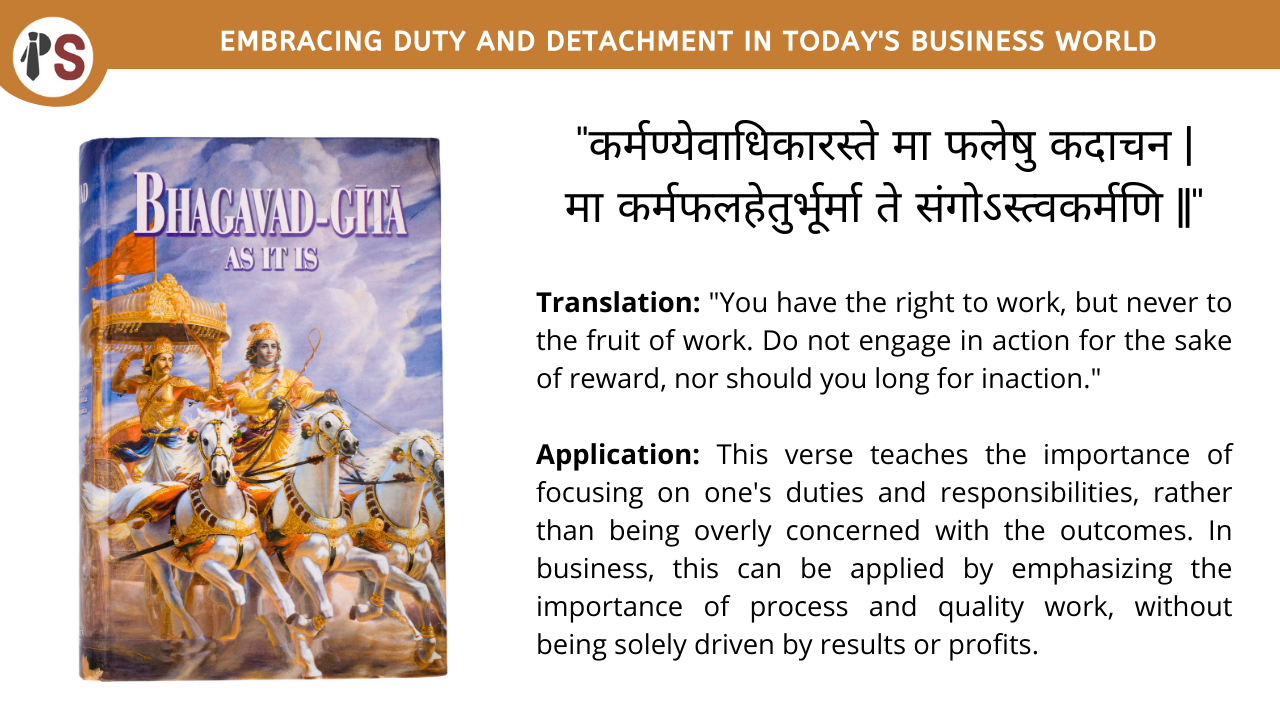
The Bhagavad Gita, an ancient Indian scripture, has offered profound life lessons for thousands of years. One such lesson comes from verse 2.47, which teaches us to focus on our duties while remaining detached from the outcomes. This timeless wisdom holds immense relevance for today's business world, where the pursuit of results often overshadows the importance of process and ethics.

"You have the right to work, but never to the fruit of work. Do not engage in action for the sake of reward, nor should you long for inaction."
This verse encourages us to concentrate on the work itself rather than being solely driven by the results. In the business context, this means prioritizing the quality of work, commitment to excellence, and adherence to ethical practices. By doing so, companies can create a sustainable and responsible work environment that fosters long-term success.
One of the core teachings of this verse is the concept of detachment from the results. In today's business world, it is easy to become fixated on outcomes, such as profits, market share, and growth. However, obsessing over these factors can lead to short-sighted decisions and unsustainable practices. By cultivating detachment, business leaders and employees can approach their work with a balanced mindset, enabling them to make decisions that prioritize long-term success and ethical considerations over short-term gains.
Verse 2.47 emphasizes the importance of performing one's duties without attachment to the outcomes. In a business context, this means that leaders and employees should commit to their responsibilities and act in the best interests of the organization, stakeholders, and the larger community. By focusing on duty, businesses can create a sense of shared purpose, promote teamwork, and maintain high ethical standards.
The verse also cautions against falling into the trap of inaction, which can be interpreted as complacency or stagnation in the business world. Companies must continuously innovate, adapt, and evolve to stay competitive and relevant. By avoiding the pitfalls of inaction, businesses can stay agile and be better prepared to navigate the challenges and opportunities that arise in today's rapidly changing business landscape.
By embracing the teachings of verse 2.47, businesses can foster a growth mindset among their employees. When individuals are not solely driven by outcomes, they are more likely to take calculated risks, embrace challenges, and learn from failures. This growth mindset can lead to increased innovation, resilience, and adaptability, which are critical for success in the modern business world.
The timeless wisdom of Bhagavad Gita's verse 2.47 offers valuable guidance for businesses in today's fast-paced and competitive environment. By focusing on the process, embracing duty and responsibility, cultivating detachment from results, avoiding inaction, and fostering a growth mindset, organizations can create a sustainable and ethically driven foundation for long-term success. In doing so, they can also contribute positively to the well-being of their employees, stakeholders, and the larger community.
At Professional Saathi, we offer a range of business consultancy services that help businesses improve their performance, achieve growth, and overcome challenges.
Copyright 2026 © Created By KTPG PROFESSIONAL SAATHI CORPORATE CONSULTANT PRIVATE LIMITED, All Rights Reserved.
Leave Your Comment